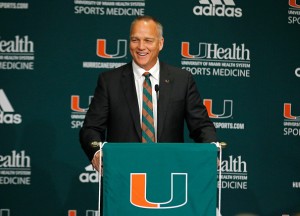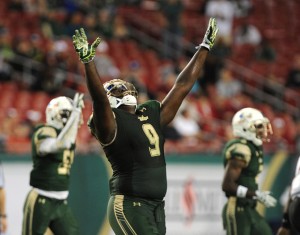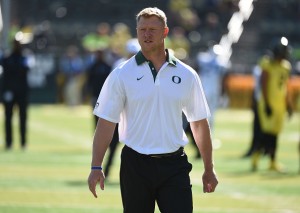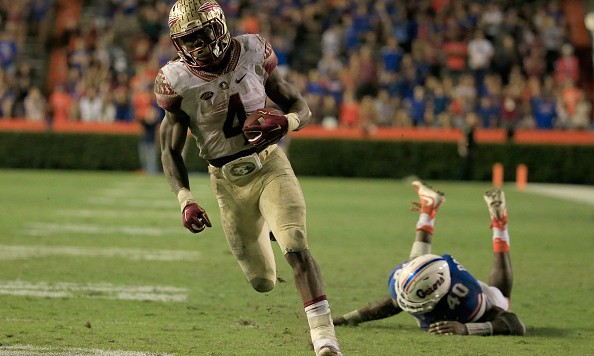The Florida State Seminoles reign supreme over the state of Florida for yet another year, having beat both the Miami Hurricanes and Florida Gators for a third straight season, while also topping a South Florida team that turned out to be better than advertised. FSU head coach Jimbo Fisher currently holds an 11-1 record against his two main rivals and has had back-to-back years of finishing atop the recruiting rankings. For FSU fans, life is good.
But as much as FSU’s own decisions affect its outcomes, so do the decisions of its in-state competition. Part of the reason Florida State became the premier program in Florida was due to the fact that both Miami and Florida entered periods with mediocre coaches and less-than-impressive seasons. For a more detailed breakdown of this situation, refer to a previous Noled Out article.

CORAL GABLES, FL – DECEMBER 04: New University of Miami Hurricanes head football coach Mark Richt speaks after he was introduced at a press conference at the school on December 4, 2015 in Coral Gables, Florida. (Photo by Joe Skipper/Getty Images)
The situation has, obviously, changed even within the last week. Earlier this week, the Hurricanes announced that they hired former Georgia head coach Mark Richt, who is largely known as a great recruiter who struggled to get his teams over the hump. He is certainly an upgrade over Al Golden however, who is largely known as a mediocre recruiter who could never get far enough on a hump for his teams to disappoint. Nevertheless, such a marquee hire for the program has Miami fans hoping that they’ll finally be back in the national spotlight as they were for nearly two decades from the early 1980’s to the immediate turn of the millennium.
A different tale has unfolded in Gainesville however. The Gators seem to have already found their guy in Jim McElwain, who is a serious (and deserving) candidate for National Coach of the Year honors. In a season where Florida was expected to finish with around eight wins and in third place in the SEC East, it has instead already reached 10 wins and on Saturday, made its first SEC Championship appearance in six years.
What McElwain has done is nothing short of astounding. Despite seeing his starting quarterback suspended a full calendar year for performance-enhancing drugs, he invigorated a team that could have easily rolled over and lost to many of its remaining opponents. Fortunately for Gator fans (and unfortunately for FSU fans), Florida is coming back around.
Yet by focusing on the Big 3 of Florida football, we inherently assume that the smaller programs are just distractions that do not have a noticeable effect on the larger programs. The events currently unfolding at UCF and USF however, illustrate that this might not be totally true.

TAMPA, FL – NOVEMBER 14:Defensive end Demetrius Hill #9 of the South Florida Bulls celebrates a defensive play against the Temple Owls in the second half at Raymond James Stadium on November 14, 2015 in Tampa, Florida. South Florida beat the Temple Owls 44-23. (Photo by Cliff McBride/Getty Images) *** Local Caption *** Demetrius Hill
The South Florida Bulls originally looked like they were going to scrape towards a 5-7 record. They were 3-3 halfway through the season and still had to face a ranked Temple team, a quietly good Navy team, and two coin-flips in East Carolina and Cincinnati.
Head Coach Willie Taggart instead showed that he just needed some time to get his team in order. The Bulls went 5-1 in their final six games and if history remains constant, will be at the top of the AAC for years to come. A report mentioned that Taggart had interviewed for the South Carolina job, which might derail the plans, but USF countered by signing Taggart to an extension through 2020. South Carolina has not yet replaced Steve Spurrier, but indications are beginning to look like Taggart won’t be that guy.
UCF however seems like the odd ball out in this group. The Knights went 0-12 in what was one of the worst seasons of the past decade for an FBS program. Why should this be noted? Because the Knights were somehow able to pull Oregon offensive coordinator Scott Frost for the head coaching position.
This hire cannot be understated — it is absolutely huge for UCF. Frost’s offenses at Oregon were exceptional and his recruiting prowess will be very useful in a talent-rich state like Florida. The results may not be there immediately, but it’s literally impossible for the program to get worse. Keep in mind that less than two years ago, UCF won the Fiesta Bowl and finished the year ranked in the top 10 nationally.
This still doesn’t directly respond to the question though, which is: how do these two schools possibly affect the Big 3?
The answer is that these two schools sit directly in two hot spots of recruiting — Orlando and Tampa. FSU, Florida, and Miami will still almost certainly have first pickings on the 5-stars and truly elite talents, but if USF and UCF continue on upward trajectories, it’s not inconceivable to see either start fighting for the 4-stars that are growing right in their backyard.
Even if the programs can’t convince these prospects to stay, they will make it so that it doesn’t become a foregone conclusion for the other schools. Florida State already has issues recruiting the Tampa area, with Florida regularly beating it out for recruits. What will happen if USF starts competing for conference titles and New Year’s Six bowl appearances?

EUGENE, OR – SEPTEMBER 19: Offensive coordinator Scott Frost of the Oregon Ducks watches his team warm up before the game against the Georgia State Panthers at Autzen Stadium on September 19, 2015 in Eugene, Oregon. (Photo by Steve Dykes/Getty Images)
Only two programs haven’t been mentioned yet, and those are Florida International and Florida Atlantic. Unlike the previous two, neither of these programs are making the strides that would seem necessary to be competitive. FIU has at least been steadily on the rise from a 1-11 season a couple of years back, while FAU finished at 3-9 for a second straight year. It’s hard to gauge just how high of a ceiling these programs have, considering both have only been to just two bowl games each, with the most recent being FIU in 2011. The Bulls and Knights have some history of beating prestigious programs in bowls.
That leaves us with five programs to watch in the upcoming years. Obviously nothing is assured and situations can change rapidly. But as it stands right now, we could be entering an unprecedented era of football success from one state. Only two other states (California and Texas) could have comparable times where there were multiple programs both competing for and sometimes winning their conferences while also experiencing national achievements.
For the time being, the Seminoles sit atop the throne of the state after conquering its three best fighters. But from here on out, it might only be getting tougher. UCF and Miami have enacted huge upgrades at their head coaching positions, with the latter possibly reasserting itself in the best recruiting land in the nation.
Meanwhile USF and Florida continue to improve under their current coaches. If Florida State wants to stay ahead of its in-state counterparts, it’ll have to continue its stellar recruiting and player development.
Knowing Fisher and his staff, they probably already have a plan.




















